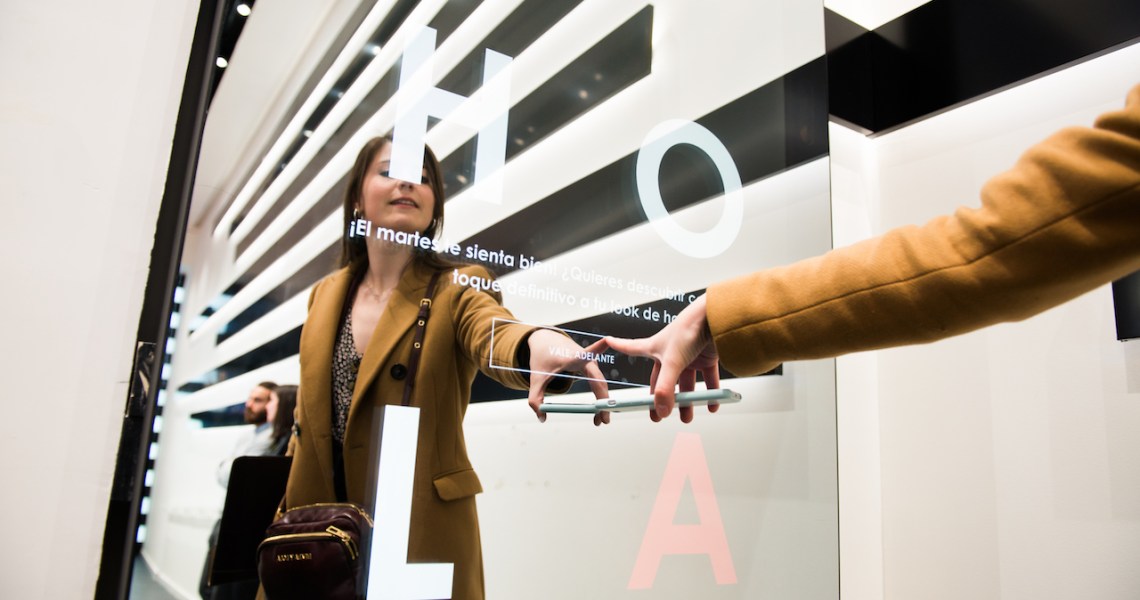As revamping the in-store retail experience becomes a de facto move for beauty retailers, Sephora Spain is betting on AI-powered intelligent mirrors.
In late March, Sephora Spain’s flagship Madrid location unveiled its new partnership with experiential innovation agency Wildbytes to offer customers personalized recommendations bridging the gap between fashion and beauty. Shoppers can now walk up to said mirrors and are suggested personalized makeup, skin-care products and fragrances, based on what they are wearing, their gender and their age. Seasonal and contextual elements, such as climate, time of day and trends are also taken into account. The products referred are meant to enforce that beauty items are the ultimate accessory for whatever a consumer might be wearing, said Irma Ugarte, Sephora Spain’s marketing director.
“Calle de Serrano is the most trafficked street in Madrid. It is primarily known as a destination for luxury fashion and lifestyle, so we wanted to create a concept that was special to that environment, especially as we open a new flagship experience and are the first cosmetics store on this street,” said Ugarte. The Sephora Spain store is situated by Louis Vuitton, Dior, Saint Laurent and Salvatore Ferragamo.
Wildbytes co-founder and CEO Julio Obelleiro said the Sephora experience is meant to mimic Amazon’s recommendation engine that accounts for 35% of the company’s revenue, but in a physical setting versus on the backend where the customer can’t directly see it. “There is a very low level of personal relevance that exists in retail. Customers are routinely suggested the same generic products,” she said.
Sephora Spain’s move follows larger industry shifts around AI: Though Sephora Spain is not facilitating AI capabilities via the cloud with Wildbytes, according to Deloitte Insights, 70% of companies will obtain AI through cloud-based software in 2019, and 65% will create AI applications using cloud-based development services. Those numbers are expected to jump to 87% and 83%, respectively, in 2020.
Sephora is featuring 70 products from brands like Origins, Farsali and Clarins among the mirror’s recommendations, and thus far, over 4,500 customers have used the experience, said Obelleiro. On average, customers are spending about 42 seconds with the mirror and clicking on the activation about 18 times. Though the AI-recommendation engine has focused on suggesting makeup to customers — popular suggestions have included Make Up For Ever’s Aqua XL Ink Liner and Kat Von D’s Lolita Eye Palette — the top-three products purchased by participating customers have been in the skin-care category, such as Origins’ High-Potency Night-a-Mins resurfacing cream, Farsali’s Unicorn Essence serum and Clarins Double Serum. This suggests that skin-care products can benefit from AI capabilities, just like color cosmetics which have often been associated with the tried-and-true virtual try-on beauty experience, explained Ugarte.
For now, Sephora Spain does not directly connect the mirror’s recommendations to Sephora.es (the mirror displays QR codes, allowing consumers to purchase the products on Sephora’s website or locate them in the store), as the retailer is focused on customers’ time spent and brand awareness, versus a KPI of conversion, said Obelleiro.
In the second half of 2019, the AI-powered mirror will be rolled out to Sephora Spain’s Barcelona flagship in the El Triangle shopping center, with the possibility of pushing it to Sephora Spain’s full fleet of 56 standalone stores (in Spain, the retailer has 136 points of sale), as well as the rest of Europe.
“When you walk into any Sephora store, you first experience our Beauty Hubs, where customers can test products. Depending on the market, that drives about 25-35% of sales — so we know people love to experience our makeup and skin care with makeup artists, but other types of customers don’t like that personal interaction or they lack the time,” said Ugarte. “We want to satisfy that on-the-go customer and respond to changing shopping habits.”




